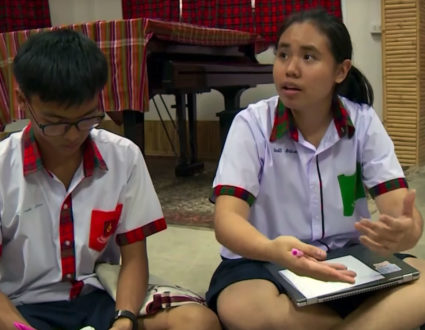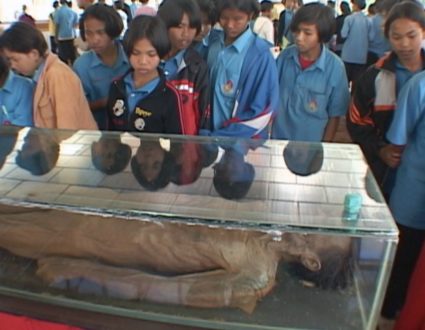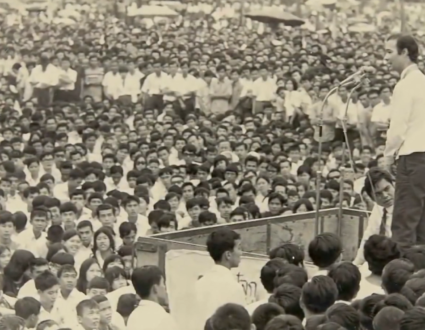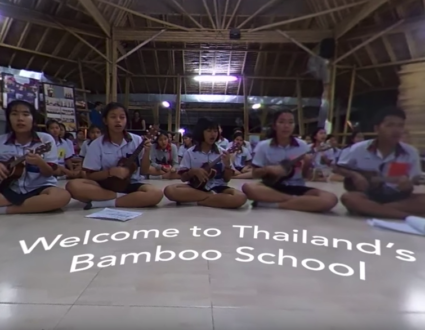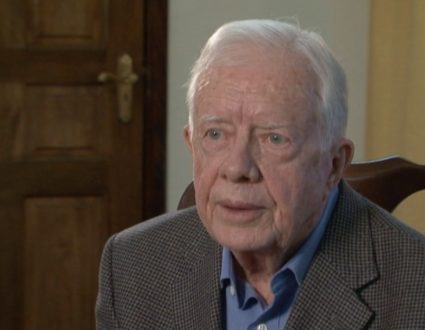Solveig Rennan: Welcome to Under-Told: Verbatim. I’m Solveig Rennan for the Under-Told Stories Project. We report from all over the world for PBS NewsHour. We’ve talked to experts and people making a difference in their communities. In this podcast we’re revisiting those under-told stories to share extended interviews we’ve done with changemakers around the world.
One of the more popular restaurants in Bangkok has an unusual name. Cabbages and Condoms isn’t your average eatery–and it’s not just because rubbers are everywhere: on sculptures, lanterns, even a condom Santa Claus at Christmastime. The restaurant has become an icon for what’s widely regarded as one of the world’s most successful family planning programs. Bringing a little humor to a taboo-laden topic is the trademark of Mechai Viravaidya—or as he’s known in his native Thailand: the Condom King
Mechai Viravaidya: One must not be embarrassed by the condom is just from a rubber tree like a tennis ball; if you’re embarrassed by the condom, you must be more embarrassed by the tennis ball there’s more rubber in it.
Solveig Rennan: No surprise, then, that in Thailand condoms are commonly called Mechais. He started out working to stabilize a growing population and reduce poverty through family planning—a key factor in Thailand’s growth into a middle income nation. When HIV/AIDS hit, a similar condom-based campaign became useful once more—one that’s widely credited with a dramatic drop in the number of HIV infections, from about 140,000 a year in 1990, to about 30,000 cases a year a decade later. Mechai hasn’t slowed down. He’s one change agent that we keep coming back to. Our correspondent, Fred de Sam Lazaro, has interviewed Mechai many times—most recently in Aprilrr 2020 by video call to see how the school Mechai founded is faring during the COVID-19 pandemic. In this episode of Under-Told: Verbatim, we’ve collected some of our favorite chats with Mechai over the years… so you can hear how he’s worked with bureaucrats, religious leaders, the media and directly with communities as an activist, while founding schools and businesses to sustain his mission. He sat down with Fred at Cabbages and Condoms…
Fred de Sam Lazaro : … First of all, talk a little bit about this, this enterprise that we’re sitting in right now with,
Mechai Viravaidya: well, we are in capitalism kind of restaurant. It’s one of our 16 businesses. As a non governmental organization, charitable organization. We depend on other people’s resources and generosity. They give us funds to do our programs. But this will not last forever// So we realized that we have to generate our own resources. What people give us come from that surplus of profit. We have to generate our own profits and not be so dependent on donors. And so for 25 years now, we’ve had businesses registered as a separate legal entity paying tax. And the profits are given to us as others give to us to run our program, almost 70% of our financial needs come from these companies, we call these companies business for social progress.
Solveig Rennan: Here’s one of our earlier interviews. In 2007, Mechai explained to Fred just how he tossed out the taboo that comes with talking about condoms and birth control, about marketing the idea of family planning.
Fred de Sam Lazaro: the thing that we hear in some parts of the world, in the subcontinent, for example, is that for a lot of poor people, more children means more hands, more income. It’s it’s pooled income. It’s pooled farm labor. It’s at what point is realization come to them or what threshold is income, they say, fewer children means a better life.
Mechai Viravaidya: Most important of all, and whatever action we’re talking about whatever information we’re talking about, must be discussed at the grassroots level. You can’t do it in the urban areas and broadcast on radio, television, newspapers and expect these people to participate and understand it. So let’s discuss at the low level, we start asking, how many acres of land did your grandparents have? Then how many do you have? Why didn’t you get 100? Why did you get 10? Well, because there were 10 children to split up the 10. Is that how many children you have now? And they may say five, there’s how many acres per child will your children get this at only two. So Wow, and and many have come up, gee, I wish my grandparents had fewer and so on, and then they realize that so that’s a start. The other point that is very well to send people into town for labor as long as there’s a market for employment, once it’s full, becomes a burden, rather than an asset. You can’t send them in for employment, there’s no employment. On the farm same time is that lots of land you need more labor. When you have little land, you don’t need all that labor. In fact, you have to sell your labor to other people because because of too many children in the family, the pieces of land became so small, they realize this pretty soon and then they know that education while free, there are other costs, transportation costs, food, books, and apparently Thailand, values education. So a lot of people say that I would like my children to have better education. So also, we had a very strong program with the Buddhist monks who are the most influential in the villages. And at the same time with teachers, rural school teachers, we trained almost 100%, 320,000 rural school teachers, about population family planning. And then we added in the new alphabet, where B for birth, C for condom, I for IUD, we had a children song that would be equivalent to the west, like Jingle Bells. We change all the words around and the song had about the misery of having too many children not enough to eat, the heartache of parents. And then the realization that we don’t have to worry, we now have contraceptive, so the songs mentions every contraceptive method. So every school child 8, 9, 10 knew of every contraceptive method. And so that’s how the whole system began.
Fred de Sam Lazaro: Thailand’s literacy rate is is almost universal. How how important a component is that? In in accounting for the success?
Mechai Viravaidya: I would say. It helped a lot for the future, the future generation, but for the current generation of adults then it was a matter of first having child survival. If children keep on dying, no one’s going to practice family planning. And a lot of people have to have eight children to have three survive. So maternal and child mortality was very important. So maternal child health is a very important partner of any family planning program. If your children die, who’s going to practice family planning, so the children have to survive, then you can limit. So those are the very important elements. And then the ones who were adults at the time. Apart from that, then you just say these contraceptives easy, they’re safe, you can choose whatever method you wish, you can have the condom, the pill or you can have the IUD or the injectable, or when you’ve had enough children, then you could have gone to sterilization. Choice, totally voluntary, grassroots operated, and those people understood and the next generation were the children who heard about it in school, they also saw what was happening. So the two went side by side, one for the future generation, one for the current generation
Fred de Sam Lazaro: and this the dispensing of all of this this contraception and information was happening in a public health kind of context?
Mechai Viravaidya: No, it was happening in a local village shop where people go where the shopkeeper knows a customer’s always right so he sells sugar, milk bread, fish sauce, toothpaste cigarettes matches, added to that were pills and condoms. So were sold in a very normal way, not in a clinical way we wanted people to feel the family planning was like your soap and toothpaste and powder, an ordinary health product that you didn’t have to go to clinic, a clinic for because that means it’s very difficult, very sophisticated, and therefore quite dangerous. We made it simple.
Fred de Sam Lazaro: But in order to to provide better public health overall, so that these children survived the infant mortality rate improved. I mean, was there a concurrent concerted effort?
Mechai Viravaidya: We were a key partner with the Ministry of Health. They did. We did the public education and they did the immu- actual immunization of children, for the women, pregnant women to go for prenatal care, postnatal care, breastfeeding, and we did the contraceptives. But we told about it. But the service of these were provided by the government we had to travel quite a long way for it. But they did.
Fred de Sam Lazaro: Talk a little bit about the the advent of contraception as an item akin to soap and toothpaste as opposed to something that you discussed in hushed tones with your doctor.
Mechai Viravaidya: I think the two key issues were the pills in the condom. The pills in most countries in the world to this day, are prescribed by doctors. Now, when we started in Thailand in the early 70s, we had one doctor per 110,000 people outside municipal areas, it was virtually impossible. So the program Introduced by the Ministry of Public Health was to train nurses with a checklist so that we have these conditions that you shouldn’t take the pill. And if you don’t have these conditions, it’s safe. This is how you do it. It succeeded very well it expanded the horizon. But that only covered the town. So they went one step further and train auxiliary midwives to do the same thing. And they were very successful. So because it was woman to woman, however, that only covered 20% of the villages. And that was already the end of the line of the health service people. So we came in for the next 80%. And we told the government explain and they approve that this would extend the service out to the people, so they wouldn’t have to walk or travel for 6070 kilometers or miles to get contraceptives, they could get right there and the minute so that’s where we came in. ,So we became a southern link in the chain, very close cooperation. They needed something more sophisticated. pills and condoms. They came to the government clinic, they paid a small amount of money for the pills and condoms. But the pill was made available in a very simple way as if you buy your toothpaste. In fact, it’s put beside the toothpaste and so don’t have to go to clinic for… soap is not dangerous toothpaste isn’t dangerous. So the pill and the condoms of course are not dangerous.
Fred de Sam Lazaro: Although there is a difference medically between pills and condoms, obviously, I mean,
Mechai Viravaidya: The perception, the perception of pills as against toothpaste and so on that. If you have a particular health standard, it’s safe, it doesn’t kill you. So not dangerous, and that was perception. If you had some side effects. It was explained and if you persisted with the side effects, you could change, or go to see the midwife further in town, change in other brand of pill or to another method altogether. So everything was there and you had a choice. Where the condoms were in particular in terms of desensitization people were embarrassed, they didn’t talk about it but the condom rather than the pill generate the most excitement and controversy or reaction. And wherever we did that it It brought up that issue. So we said look, one must not be embarrassed by the condom is just from a tree like a tennis ball you embarrassed by the condom, you must be more embarrassed by the tennis ball there’s more rubber in it. We said you could use it as a balloon as a turniquet for snake bites and deep cuts. You can use lubrication for aftershave lotion and use the ring of the condom as a headband, what a wonderful product. Why be embarrassed by it? Knives kill and you’re not embarrassed by that? Condoms save lives and you’re embarrassed, something’s wrong. So let’s get used to the condom. So we gave them out all over and said look, the condom is clean if your mind is not dirty. So please take one and a lot of people laughed and did and then the next was a condom blowing championship. This really brought people great sense of relaxation, they laugh, that’d be an audience of 200 with us everyone to get a condom to touch it, fold it, hold it, blow it up. And then we would have a competition for the one of the biggest blown up condom without bursting. So they saw the strength of it, the cleanliness, once they put the condom to their lips, things have changed in their mind. So this is what we did to desensitize. Not just the issue of family of condoms, but of contraceptives as a whole. So that was a major thing. And of course, they don’t teach any of this in universities. We’ve picked it up by observing the public.
Solveig Rennan: many experts say Thailand’s stable population was no coincidence…but as per capita income and gross domestic product increased, so did inequality between urban areas and rural. That became Mechai’s next target. As Mechai’s operation grew, he expanded focus and began attacking poverty from another direction. Here’s a clip from our 2019 report about the Mechai bamboo school
Fred: The Bamboo School was started nine years ago in rural Eastern Thailand as a way to inspire young villagers to bring economic development to their communities.
On a typical day, students might be performing for patients at a nearby hospital. That’s after handing out meals they had prepared at the school kitchen using produce grown in the school garden. Students do learn in traditional classrooms, but the emphasis is hands-on. Soon, these math students are outside taking measurements and making real-world calculations about how much can be planted in a pot.
Mechai Viravaidya: So, this is mobile. You can take it into the village from one house to another on the back of a motorbike.
Fred de Sam Lazaro: It’s a portable solar-powered water, pump designed, he said, by the students.
Mechai Viravaidya: And this is what we’re always trying to do, and let the kids to think how to improve whatever we do. And they come up with many good ideas.
Solveig Rennan: Six years after our first story on the Bamboo School, Fred returned for a progress report
Fred de Sam Lazaro: What are your mind the most significant things that have changed since then, grown, things learned, things unlearned
Mechai Viravaidya: Well, in terms of outside people, a lot more interest, more people have come have seen, have asked questions have realized that what can be done is possible for them also. So that’s the first one. And we’ve been able to add on, for instance, from just helping a school, to have vegetable garden and have income, have our own fund, into turning a school into a gateway for social economic advancement in all the villages surrounding the school. So all of a sudden we see the school as a diamond. It was a sort of a piece of glass before and we had not seen it in early days. And after the school has been going for some time, we’ve been able to see this so that we now see huge potential. And the other one that we have seen is that the government has become very, very interested, including the Prime Minister. And he has asked us to take a lead in what they now call the partnership school, whereby business communities are asked to partner with government schools, and to improve the running of the school to be on the board to be the chair, and to get people out of poverty, to reduce migration. So in other words, all of a sudden, the Prime Minister now has come up with a new policy in education based on what we’ve done, where the school is more than just a school that all of us used to know. A school as a lifelong learning Learning Center as a hub for social and economic advancement in the communities. And now we begin to see how we can help other countries. Now we’re going to around the border between Thailand and Laos and Vietnam, Laos and Cambodia and Myanmar, to have a school on either side and slowly expand. I hope that they will with sufficient interest in donor communities, into the Mekong countries to have this sort of approach, and I think that the whole world can recognize the fact that you have so many schools, they all have legal. They become legal entities as land as building this teachers, and the utilize in the school all around the world can be used as a new entry point for social economic advancement. It just seems so simple right now. We didn’t see it before. Now we see it very clearly. And people seem to like it. There seems to be nobody opposing the concept that a school can be more than what it used to be.
Fred de Sam Lazaro: Is there anything that you thought was a good idea when you began this that evolved to be less than a good idea, things that you had to change or just abandon
Mechai Viravaidya: My approach has stayed the same but more realistic in the limitation of funds to help expand these activities, for instance, we have so many people saying, Oh, we should have this sort of school, all over the place. I said, Well, I don’t have a money printing machine. So that’s the limitation at this stage. It could be because we have not made ourselves sufficiently well known to the people who do have the resources to help us expand. So that’s one thing we probably have to do in the future. And if organizations around the world can agree with it, and can help can help to do with it, I would be happy to to join in the movement.
Fred de Sam Lazaro: One of the, the constants in your life has been //the embrace of causes for marginalized people. And yet the roots of what started at all are in family planning and in condoms, explain the continuity if, if there is one. What did you just make a U turn somewhere or a sharp pivot?
Mechai Viravaidya: Well, I was in government and I had a radio program, I had a television program. I had a newspaper column, I taught at university. So those things gave me an audience which which was was very beneficial in getting ideas across, and by going out and up country and I realized that we have so many children and we needed to reduce the birth rate. So that’s the first part. But it took a long time to get the government to agree to a policy. There was policy, but no money. So I started getting money from the outside to get a policy and to get a program started of making contraceptives available all over the place. So that change from seven kids per family to be under two, in over 20 years at work, then HIV came along. And we also have to do that we didn’t design HIV, it came along and we said we didn’t do anything about it. All the benefit gains, which had been achieved would be wiped out. So we tackle it and we had to do many things to to go behind the back to the government, to the military to get the program on television on radio stations of the military to get it done. So that came along. And then at the same time from family planning, we also had poverty eradication, the best people to help you out of poverty is to get the people who know how to make money. Government only knows how to take money. So we went to the business community in a partnership with the poor communities to get activities going. So we went straight to the, to the village. And then, of course, social and entrepreneurship has been going along right from day one, to have businesses to help yourself and put profit back in. But then, over just over 10 years ago, we came across this need to improve education. So that’s what we introduced in going. So it was one thing led to another was just, it was a natural tendency, that we said that education really needs to be improved because people were coming through education and not showing very much in terms of achievement. From all that money spent. We are the second highest proportion of the national budget, in terms of education in the whole world behind Hong Kong, but the results are disastrous.
Fred de Sam Lazaro: So How did that realization come to you that that this is where energy needed to be spent?
Mechai Viravaidya: I started giving scholarships, asking for money. And then I realized that that was giving them at best mediocrity, gave the opportunity to reach mediocrity. Why not have your own printing press? Why not have your own school? And that was the idea when I saw what was happening in the regular school system. We came up with our own school.
Solveig Rennan: We’re putting this podcast together in October of 2020, while the United States continues to battle COVID-19. The pandemic threw a wrench, briefly, in many of Mechai’s projects, including the Bamboo school. Fred connected again with Mechai by video call in April. Since then, Thailand and many of its neighbors have managed to flatten the curve. With a population of 70 million, Thailand has seen fewer than 100 COVID deaths. But it has not reopened its borders to tourists, a large driver of its economy and the cash registers at places like Cabbages and Condoms. The restaurant has, nonetheless, reopened. So too has the Bamboo School, after students were sent home for weeks…Mechai told Fred they went with some money and instructions on how to put it to use
Mechai Viravaidya: We believe that the fact that they have learned how to grow vegetables extremely well, we are asking them to grow vegetables at home at this time to have food and income. And we would also like them to use the money we can provide them in the future, to buy vegetable seeds, to give them to elderly people in the villages to grow vegetables to help themselves.
Fred de Sam Lazaro: You’ve emphasized life skills in the school and all of a sudden, they’re being put to use very, very quickly, in real life unexpectedly.
Mechai Viravaidya: This is the situation that we didn’t anticipate, but we have always wanted to get them ready for whatever future. But we did not expect it to be as severe as it is. And with that, that we have started we have started doing this with the students earlier on.
Fred de Sam Lazaro: All right, well, each Mechai Viravaidya is there anything else that you’d like to share with us?
Mechai Viravaidya: Well, we’d like to send our best wishes to all the people listening to the program and I know times are difficult, but cheer up it’s not the end of the world. We will win at the end
Fred de Sam Lazaro: All right
Solveig Rennan: Our interviews with Mechai Viravaidya have been featured in many of our PBS NewsHour stories… To explore his work throughout the years, go to undertoldstories-dot-org. This episode was hosted and edited by me, Solveig Rennan, and produced by Simeon Lancaster. The interviews were conducted by our director Fred de Sam Lazaro. You can find every Under-Told: Verbatim episode, virtual reality 360 experiences and our entire library of Under-Told news reports from around the world at undertoldstories-dot-org.
Under-Told: Verbatim is brought to you by the Under-Told Stories Project based at the University of St. Thomas in Minnesota. As always, thanks for your support.
Cabbages and Condoms
In the Bangkok restaurant Cabbages and Condoms, rubbers are everywhere: on sculptures, lanterns, even a condom Santa Claus at Christmastime. The place has become an icon for what’s widely regarded as one of the world’s most successful family planning programs. Bringing a little humor to a taboo-laden topic is the trademark of Mechai Viravaidya—or as he’s known in his native Thailand: the Condom King. No surprise, then, that in Thailand condoms are commonly called Mechais. He started out working to stabilize a growing population and reduce poverty through family planning—a key factor in Thailand’s growth into a middle income nation. When HIV/AIDS hit, a similar condom-based campaign became useful once more—one that’s widely credited with a dramatic drop in the number of HIV infections, from about 140,000 a year in 1990, to about 30,000 cases a year a decade later. Our correspondent, Fred de Sam Lazaro, has interviewed Mechai many times—most recently in April 2020 by video call to see how the school Mechai founded is faring during the COVID-19 pandemic. In this episode of Under-Told: Verbatim, we’ve collected some of our favorite chats with Mechai over the years so you can hear how he’s worked with bureaucrats, religious leaders, the media and directly with communities as an activist, while founding schools and businesses to sustain his mission.


